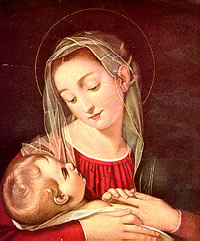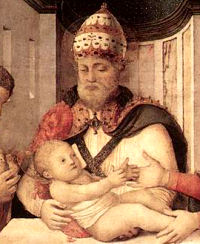The Bible tells us that Mary “brought forth her first-born son” and that He was called Jesus (Matthew 1:25). We also read in the Gospel of John that Jesus is the Word made flesh. The Word, Who was God, assumed human nature in the womb of Mary (John 1:15). We are referring here to the mystery of the Incarnation, the Word becoming flesh. Jesus Christ (the Second person of the Holy Trinity, one in being with the Father) entered this world, taking on human flesh and a human soul. Jesus is true God and true man. Because we believe that Mary was truly the mother of Jesus, and that Jesus was truly God from the first moment of His conception, then it makes perfect sense that Mary is truly the Mother of God.
We must be careful and make clear that we are not saying that Mary created the divine person of Jesus. Mary gave birth to Jesus, the God-Man. When God “assumed” or “took on” a human nature, it was the result of His perfect will to do so. He chose to be born of her. Therefore, it cannot be said that Mary created God or that she existed before God. We simply mean that a woman is considered a man’s mother when she has conceived and given birth to him.
St. Cyril, Bishop of Alexandria, who defended this teaching, stated that “it was not that an ordinary man was born first of the Holy Virgin, on whom afterwards the Word descended. What we say is that, being united with the flesh from the womb, (the Word) has undergone birth in the flesh, making the birth in the flesh His own…” Therefore, the Blessed Virgin Mary is rightly called Mother of God (Theotokos).
New Year’s Day is the day the Catholic Church celebrates the divine motherhood of Mary, which is based on the teaching of the Gospels, on the writings of the early Fathers, and on the express definition of the Church. It is a beautiful title for Mary. What many do not realize is that this is a name that Christians have been using in reference to her for almost seventeen centuries. In order to understand how we can call Mary the Mother of God, we must first realize and accept the fact that our faith is grounded in mystery. There is much we do not fully understand now, but one day we will. That which we do understand, however, comes to us from what God has revealed.
The Bible tells us that Mary “brought forth her first-born son” and that He was called Jesus (Matthew 1:25). We also read in the Gospel of John that Jesus is the Word made flesh. The Word, Who was God, assumed human nature in the womb of Mary (John 1:15). We are referring here to the mystery of the Incarnation, the Word becoming flesh. Jesus Christ (the Second person of the Holy Trinity, one in being with the Father) entered this world, taking on human flesh and a human soul. Jesus is true God and true man. Because we believe that Mary was truly the mother of Jesus, and that Jesus was truly God from the first moment of His conception, then it makes perfect sense that Mary is truly the Mother of God.
We must be careful and make clear that we are not saying that Mary created the divine person of Jesus. Mary gave birth to Jesus, the God-Man. W
New Year’s Day is the day the Catholic Church celebrates the divine motherhood of Mary, which is based on the teaching of the Gospels, on the writings of the early Fathers, and on the express definition of the Church. It is a beautiful title for Mary. What many do not realize is that this is a name that Christians have been using in reference to her for almost seventeen centuries. In order to understand how we can call Mary the Mother of God, we must first realize and accept the fact that our faith is grounded in mystery. There is much we do not fully understand now, but one day we will. That which we do understand, however, comes to us from what God has revealed.
The Bible tells us that Mary “brought forth her first-born son” and that He was called Jesus (Matthew 1:25). We also read in the Gospel of John that Jesus is the Word made flesh. The Word, Who was God, assumed human nature in the womb of Mary (John 1:15). We are referring here to the mystery of the Incarnation, the Word becoming flesh. Jesus Christ (the Second person of the Holy Trinity, one in being with the Father) entered this world, taking on human flesh and a human soul. Jesus is true God and true man. Because we believe that Mary was truly the mother of Jesus, and that Jesus was truly God from the first moment of His conception, then it makes perfect sense that Mary is truly the Mother of God.
We must be careful and make clear that we are not saying that Mary created the divine person of Jesus. Mary gave birth to Jesus, the God-Man. When God “assumed” or “took on” a human nature, it was the result of His perfect will to do so. He chose to be born of her. Therefore, it cannot be said that Mary created God or that she existed before God. We simply mean that a woman is considered a man’s mother when she has conceived and given birth to him.
St. Cyril, Bishop of Alexandria, who defended this teaching, stated that “it was not that an ordinary man was born first of the Holy Virgin, on whom afterwards the Word descended. What we say is that, being united with the flesh from the womb, (the Word) has undergone birth in the flesh, making the birth in the flesh His own…” Therefore, the Blessed Virgin Mary is rightly called Mother of God (Theotokos).
hen God “assumed” or “took on” a human nature, it was the result of His perfect will to do so. He chose to be born of her. Therefore, it cannot be said that Mary created God or that she existed before God. We simply mean that a woman is considered a man’s mother when she has conceived and given birth to him.
St. Cyril, Bishop of Alexandria, who defended this teaching, stated that “it was not that an ordinary man was born first of the Holy Virgin, on whom afterwards the Word descended. What we say is that, being united with the flesh from the womb, (the Word) has undergone birth in the flesh, making the birth in the flesh His own…” Therefore, the Blessed Virgin Mary is rightly called Mother of God (Theotokos).







 1st
1st  The solemnity of 1 January, an eminently Marian feast, presents an excellent opportunity for liturgical piety to encounter popular piety: the first celebrates this event in a manner proper to it; the second, when duly catechised, lends joy and happiness to the various expressions of praise offered to Our Lady on the birth of her divine Son, to deepen our understanding of many prayers, beginning with that which says: "Holy Mary, Mother of God, pray for us, sinners."
The solemnity of 1 January, an eminently Marian feast, presents an excellent opportunity for liturgical piety to encounter popular piety: the first celebrates this event in a manner proper to it; the second, when duly catechised, lends joy and happiness to the various expressions of praise offered to Our Lady on the birth of her divine Son, to deepen our understanding of many prayers, beginning with that which says: "Holy Mary, Mother of God, pray for us, sinners."  The old liturgy celebrated three feasts in one. The first was that which the old Roman sacramentaries called "the octave of the Lord," and indeed the greater part of the Mass was of the octave of Christmas with many extracts from the Masses of Christmas. Various portions of the Mass and Office celebrated the divine maternity of Mary. The third feast was that of the Circumcision which has been celebrated since the sixth century. Eight days after His birth Christ underwent, like all the Jews, this rite enjoined on Abraham by God as a pledge of his faith, and He received the name of Jesus.
The old liturgy celebrated three feasts in one. The first was that which the old Roman sacramentaries called "the octave of the Lord," and indeed the greater part of the Mass was of the octave of Christmas with many extracts from the Masses of Christmas. Various portions of the Mass and Office celebrated the divine maternity of Mary. The third feast was that of the Circumcision which has been celebrated since the sixth century. Eight days after His birth Christ underwent, like all the Jews, this rite enjoined on Abraham by God as a pledge of his faith, and He received the name of Jesus.